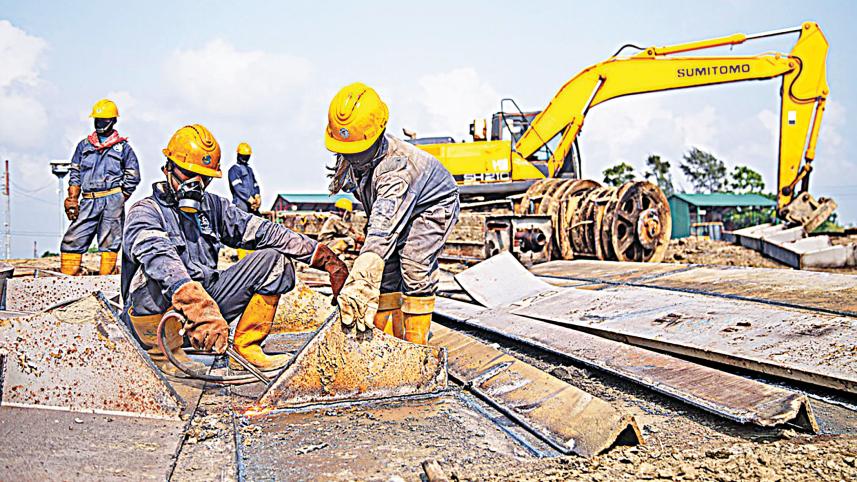The costs of Bangladesh’s shipbreaking industry

The ship-breaking industry in Bangladesh has been a source of national pride for decades, and it has also been potential source of environmental disaster too at the same time. Being one of the world's largest ship-breaking industries, thousands of people, primarily from marginalised communities, are employed to dismantle derelict ships under the open sky. However, the coastline gets contaminated with asbestos, heavy metals, oil waste, and other harmful particles beneath the surface of economic benefit.
Bangladesh became a major shipbreaking centre in the early 1980s, when stricter laws on the environment and workers forced Western yards to close. What started as a means to make money has turned into a deeply rooted enterprise having numerous implications for people and the environment. Even when statistics showed that injury rates were increasing and the shoreline was becoming polluted, successive governments continued to support the sector, as it created jobs and produced steel. The Ship Breaking and Recycling Rules 2011 and the Bangladesh Ship Recycling Act 2018 (BSR Act) both established legal protections intended to mitigate these harms. However, they have not been effective due to lack of enforcement.
The human cost is also significant. A 2023 report by Human Rights Watch details how shipyards consistently compromise safety, discharge hazardous waste onto land, and deny workers equitable wages, rest, or compensation for injuries, exposing a system that evades international export regulations. Similarly, medical research from Chattogram indicates that shipyard workers experience respiratory diseases and malignancies at an elevated rates compared to national averages. Local inhabitants, especially minors, have elevated blood lead and cadmium concentrations directly associated with metal scrap dust and oil pollution.
Regulatory agencies also need independent enforcement units empowered to issue immediate stop-work orders and levy substantial fines. Simultaneously, coastal communities must have statutory standing to bring civil actions for ecological and health damages- a model that has succeeded in neighbouring jurisdictions. International partners should also come forward by conditioning technical assistance and loans on demonstrable improvements in health and environmental indicators and requiring third-party audits of the shipyards.
Additionally, the mangrove buffer is deteriorating, exacerbating storm surges and diminishing fish populations. These detriments worsen the pre-existing vulnerabilities, poverty, inadequate healthcare, and climate risks, necessitating legal solutions that transcend mere aspirational directions.
Industry proponents, on the other hand, point to thousands of jobs and the supply of scrap steel to mills. However, when a worker loses limbs or contracts a chronic disease, the cost shifts to families and the public health system. These social and environmental externalities are omitted from official economic accounts.
International treaties reinforce Bangladesh's obligations. As party to the Basel Convention and the Hong Kong Convention on Ship Recycling, we have committed to prohibiting hazardous waste exports for unsafe recycling. Yet vessels continue to arrive on our beaches with toxic inventories intact. National courts have issued orders requiring pre‑beaching clean-up and the provision of protective gear, but compliance remains minimal.
In fact, meaningful reform will require both top-down and bottom-up initiatives. Dry-dock recycling facilities, modelled on Turkish and Chinese yards, contain contaminants within sealed docks and treat waste systematically. While initial investment is high, the long-term benefits- safer employment, healthier ecosystems, compliance with international norms- outweigh the costs. Hence, Parliament must amend the BSR Act 2018, making dry-dock conversion within five years mandatory. At the same time, it should impose criminal sanctions for deliberate non‑compliance with such mandate and extend "producer responsibility" to former ship owners.
Regulatory agencies also need independent enforcement units empowered to issue immediate stop-work orders and levy substantial fines. Simultaneously, coastal communities must have statutory standing to bring civil actions for ecological and health damages- a model that has succeeded in neighbouring jurisdictions. International partners should also come forward by conditioning technical assistance and loans on demonstrable improvements in health and environmental indicators and requiring third-party audits of the shipyards.
Indeed, the challenge we face is not solely industrial. The issue is our constitutional obligation to uphold the right to life, health, and a secure environment. Although our supreme law upholds these rights, unrestrained industry undermines them. Citizens, civil society organisations, and the global community must advocate for accountability, ensure enforcement of the existing laws, and uphold our international commitments.
The writer is Lecturer in law and Assistant Course Coordinator at Sonargaon University, Dhaka.
 For all latest news, follow The Daily Star's Google News channel.
For all latest news, follow The Daily Star's Google News channel.
Comments